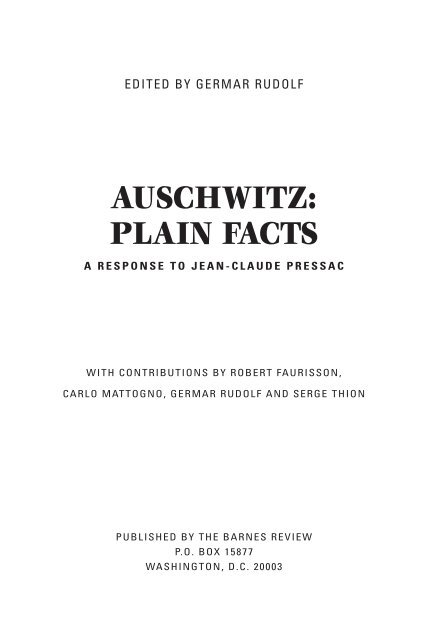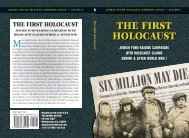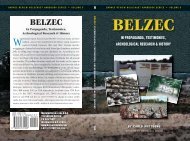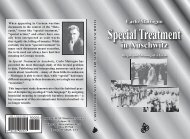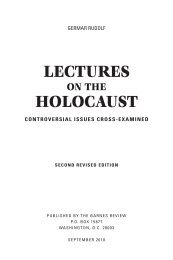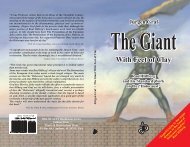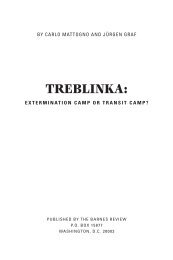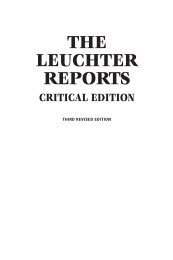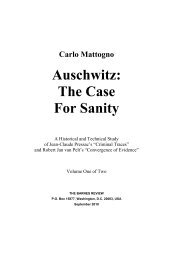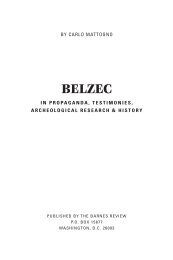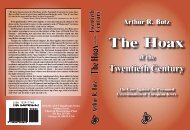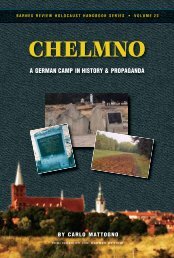14-apf-intro.pdf - Holocaust Handbooks
14-apf-intro.pdf - Holocaust Handbooks
14-apf-intro.pdf - Holocaust Handbooks
Create successful ePaper yourself
Turn your PDF publications into a flip-book with our unique Google optimized e-Paper software.
EDITED BY GERMAR RUDOLF<br />
AUSCHWITZ:<br />
PLAIN FACTS<br />
A RESPONSE TO JEAN-CLAUDE PRESSAC<br />
WITH CONTRIBUTIONS BY ROBERT FAURISSON,<br />
CARLO MATTOGNO, GERMAR RUDOLF AND SERGE THION<br />
PUBLISHED BY THE BARNES REVIEW<br />
P.O. BOX 15877<br />
WASHINGTON, D.C. 20003
HOLOCAUST HANDBOOKS SERIES—VOLUME <strong>14</strong>:<br />
Auschwitz: Plain Facts—A Response to Jean-Claude Pressac<br />
Edited by GERMAR RUDOLF<br />
The contribution by Carlo Mattogno (Italian) was translated by Anne Sharp. The<br />
contributions by R. Faurisson (French) and Germar Rudolf (German) were translated<br />
by Michael Humphrey. The contribution by Serge Thion was translated by<br />
himself and Mark Weber.<br />
Originally published by Castle Hill Publishers (an imprint of Theses & Dissertation<br />
Press) —September 2005<br />
Reprinted by THE BARNES REVIEW—November 2010<br />
ISBN: 978-0-9742303-7-5<br />
ISSN: 1529-7748<br />
Published by THE BARNES REVIEW<br />
Manufactured in the United States of America<br />
Distribution USA/America:<br />
TBR BOOKS,THE BARNES REVIEW<br />
P.O. Box 15877<br />
Washington, D.C. 20003, USA<br />
1-877-773-9077<br />
Distribution Europe/Africa: Castle Hill Publishers<br />
P.O. Box 243<br />
Uckfield, TN22 9AW, UK<br />
Distribution Australia/Asia: Peace Books, P.O. Box 3300<br />
Norwood, 5067, Australia<br />
www.BarnesReview.com<br />
www.<strong>Holocaust</strong><strong>Handbooks</strong>.com<br />
www.vho.org/GB/Books/atcfs<br />
If these sites are inaccessible, try it with www.anonymizer.com<br />
Set in Times New Roman<br />
Cover illustrations left to right: Jean-Claude Pressac; photo of the disinfestation facility<br />
in the gypsy camp at Auschwitz; letter by the Topf company to the Central<br />
Construction Office Auschwitz in regard to gas testers (see 183 of this book).
Table of Contents<br />
Page<br />
Preface ..............................................................................................................9<br />
By Germar Rudolf<br />
1. The End of Jean-Claude Pressac ..............................................................9<br />
2. Should there Be Freedom for Revisionism?...........................................10<br />
3. Unrestricted Research and Revision: Basis of Science ..........................11<br />
4. Toward Freedom of Expression .............................................................15<br />
5. Battle Zone “Common Knowledge” ......................................................16<br />
6. On the Defense of Human Rights...........................................................18<br />
Pressac and the German Public....................................................................21<br />
By Germar Rudolf<br />
1. The Claim...............................................................................................21<br />
1.1. The Media ................................................................................................ 21<br />
1.2. The Judicial System ................................................................................. 24<br />
1.3. The Historians.......................................................................................... 26<br />
2. The Reality .............................................................................................27<br />
2.1. The Scientific Basis.................................................................................. 27<br />
2.2. Technology and Physical Science ............................................................ 28<br />
2.3. Historiography ......................................................................................... 29<br />
3. The Evaluation .......................................................................................29<br />
3.1. The Press.................................................................................................. 29<br />
3.2. Justice....................................................................................................... 32<br />
3.3. Historians ................................................................................................. 33<br />
4. The Freedom of Science.........................................................................33<br />
History by Night or in Fog? ..........................................................................37<br />
By Serge Thion<br />
The Reception of Pressac ............................................................................48<br />
Reply to Jean-Claude Pressac on the Problem of the Gas Chambers ......59<br />
By Robert Faurisson<br />
Note to the Reader.......................................................................................59<br />
Foreword .....................................................................................................60<br />
1. Introduction ............................................................................................63<br />
1.1. Neither a Photograph nor a Drawing........................................................ 63<br />
1.2. Nothing of a Novelty................................................................................ 63<br />
1.3. Auschwitz: 800,000 Dead Instead of Nine Million.................................. 64<br />
1.4. Pressac no Longer Believes in “Wannsee,” but he still Believes in<br />
Hitler ........................................................................................................ 65<br />
1.5. The Theory of “Casual Gassings”............................................................ 65<br />
1.6. Pressac’s Promises and Reality ................................................................ 66<br />
5
6 Germar Rudolf (ed.), Auschwitz: Plain Facts<br />
2. The Obvious Facts that Pressac Could not Ignore..................................68<br />
2.1. “Wannsee” is no Longer “Wannsee” ....................................................... 68<br />
2.2. Not much Could be Secret about Auschwitz............................................ 68<br />
2.3. The Archives Have Survived in Very Great Number............................... 69<br />
2.4. 1972, the two Chief Architects Had to Be Acquitted............................... 69<br />
2.5. Typhus Epidemics Combated through the Use of Zyklon B.................... 70<br />
2.6. Cremation: a Hygienic Measure............................................................... 72<br />
2.7. Crematories Planned without Homicidal Gas Chambers ......................... 72<br />
2.8. Other Obvious Facts that he Could not Fail to Mention........................... 73<br />
3. Realities that Pressac Never Mentions ...................................................74<br />
3.1. Neither a Photograph nor a Plan of Crematory I...................................... 74<br />
3.2. No Photograph of the “Gas Chamber” of Crematory II ........................... 74<br />
3.3. Not a Word about the Forensic Studies.................................................... 75<br />
3.4. Not one Complete Photograph from The Auschwitz Album ..................... 75<br />
3.5. Not a Word about the Aerial Reconnaissance Photos .............................. 76<br />
3.6. Not a Word about the Morgue Corpse Register (Leichenhallenbuch) ..... 76<br />
3.7. Other Documents Passed over in Silence................................................. 77<br />
3.8. Other Silences .......................................................................................... 77<br />
4. Expedients that Pressac Borrows from other Historians ........................78<br />
4.1. Unsubstantiated Assertion........................................................................ 78<br />
4.2. Recourse to Unverified Testimonies ........................................................ 79<br />
4.3. Deciphering the Code............................................................................... 82<br />
4.4. The “Slips” and “Bungles” of the SS ....................................................... 83<br />
5. Deceits that are Pressac’s own ...............................................................86<br />
5.1. Improper Insertions .................................................................................. 86<br />
5.2. Marrying a Big Lie to a Small Truth........................................................ 87<br />
5.3. Tampering with Plans and Maps.............................................................. 88<br />
5.4. Deceptive Wording even in the Titles...................................................... 88<br />
5.5. Substitution of “(Homicidal) Gas Chamber” for “Morgue”..................... 89<br />
5.6. Substitution of “(Homicidal) Gas Chamber” for “Disinfection<br />
Chamber” ................................................................................................. 89<br />
5.7. Documents with no Bearing on the Elements to Be Proved..................... 90<br />
5.8. Use of Fictitious References .................................................................... 91<br />
5.9. A Deliberately Maintained Confusion ..................................................... 92<br />
5.10. The Tightrope Walker and the Hoaxer..................................................... 93<br />
5.11. A Concentrate of Deceptions: the Two Accounts of Homicidal<br />
Gassings ................................................................................................... 93<br />
5.12. A Hail Storm of Deceptions..................................................................... 94<br />
6. The Ramblings of the Novelist...............................................................96<br />
7. Conclusion............................................................................................100<br />
8. Appendix: Document NI-9912.............................................................103<br />
9. Three Further Notes to my Reply to Jean Claude Pressac ...................112<br />
9.1. Jean Claude Pressac and Robert Jan van Pelt......................................... 112<br />
9.2. Fundamental Questions about Auschwitz .............................................. 113<br />
9.3. Ten Years Ago, Jean-Claude Pressac’s Capitulation ............................. 1<strong>14</strong>
Table of Contents 7<br />
Auschwitz: The End of a Legend ...............................................................117<br />
By Carlo Mattogno<br />
1. Introduction to this New Edition ..........................................................117<br />
2. Introduction ..........................................................................................118<br />
3. The Cremation Ovens of Auschwitz-Birkenau According to Jean-<br />
Claude Pressac......................................................................................121<br />
3.1. Capacity: The Facts................................................................................ 123<br />
3.2. The Coke................................................................................................ 127<br />
3.3. The Ovens .............................................................................................. 127<br />
3.4. The Flames............................................................................................. 130<br />
3.5. The Pits .................................................................................................. 130<br />
4. The Cremation Ovens of Auschwitz-Birkenau According to<br />
Cremation Technology.........................................................................131<br />
4.1. Coke Consumption................................................................................. 131<br />
4.2. Capacity ................................................................................................. 132<br />
4.3. The Reason For Constructing Large Crematories .................................. 133<br />
4.4. Number of Cremations in 1943: Estimate of the SS. ............................. 133<br />
4.5. Number Cremated in 1943: Coke Consumption .................................... 134<br />
4.6. Cremation Capacity of the Crematories in 1943 .................................... 134<br />
4.7. The Duration of the Fireproof Brick of the Cremation Ovens................ 135<br />
4.8. The Deportation and “Extermination” of the Hungarian Jews............... 137<br />
5. Genesis and Development of the “Final Solution”...............................138<br />
5.1. Choosing Auschwitz as Extermination Center....................................... 138<br />
5.2. Auschwitz: The First Gassing ................................................................ <strong>14</strong>1<br />
6. Crematories II and III...........................................................................<strong>14</strong>4<br />
6.1. The Originally Intended Use of the Crematories ................................... <strong>14</strong>4<br />
6.2. The Term “Special”................................................................................ <strong>14</strong>5<br />
6.3. The Purpose of Zyklon B Deliveries...................................................... <strong>14</strong>7<br />
6.4. Structural Changes of the Crematories................................................... <strong>14</strong>9<br />
6.5. Ventilation System................................................................................. 153<br />
6.6. “Gassing Cellar” and other “Glitches”................................................... 156<br />
6.7. The “Normal Gas Chamber”.................................................................. 158<br />
6.8. “10 Gas Testers “: The Definite Proof?.................................................. 160<br />
7. Bunkers 1 and 2....................................................................................161<br />
8. Crematories IV and V...........................................................................165<br />
9. Conclusion............................................................................................169<br />
10. Appendix ..............................................................................................170<br />
10.1. Preface to the Documents....................................................................... 170<br />
10.2. Documents ............................................................................................. 172<br />
11.3. Glossary ................................................................................................. 187<br />
Bibliography.................................................................................................191<br />
Index of Names.............................................................................................195
9<br />
Preface<br />
By Germar Rudolf<br />
1. The End of Jean-Claude Pressac<br />
Between the late 1980s and the mid 1990s, French pharmacist Jean-Claude<br />
Pressac was the darling of Western media with respect to research into the history<br />
of the concentration camp Auschwitz. The media hoped to have found in<br />
him the technically qualified expert who could counter the arguments and the<br />
methods of those who wish to revise the history of the concentration camp<br />
complex Auschwitz in particular and the <strong>Holocaust</strong> in general. The contributions<br />
of Serge Thion and myself give an overview of this exaggerated praise<br />
from the judicial system, the media, and scientists. My own article makes it<br />
clear that these hymns of praise have been premature and that Pressac’s book<br />
does not meet the standards of scientific work.<br />
Even in terms of technical competence, the work Pressac has delivered is<br />
unsatisfactory in many respects, as Prof. Faurisson and Carlo Mattogno will<br />
show in this book. His friends of the same cast of opinion also seem to be<br />
skeptical of his technical qualifications, since the English version of Pressac’s<br />
last 1 work was somewhat censored by being subsumed in a collection supported<br />
by other pieces, as Prof. Faurisson will show in his short addendum.<br />
The present book was written to demonstrate to the world that the works of<br />
the one who has been advertised as the Auschwitz specialist were better considered<br />
to be novels than studies that should be taken seriously as a work of<br />
historical science. The present book constitutes a corrective review, with the<br />
consequence that the historical account on the subject of the concentration<br />
camp complex Auschwitz will be fundamentally revised. The revision of the<br />
historical account on concentration camp Auschwitz, begun by revisionists<br />
and brought before a broader public by Pressac, now returns to its origins.<br />
1<br />
Pressac died in summer 2003, see Jürgen Graf, “Jean-Claude Pressac and revisionism,” The<br />
Revisionist 1(4) (2003), pp. 426-432; Carlo Mattogno, “My Memories of Jean-Claude Pressac,”<br />
ibid., pp. 432-435.
10 Germar Rudolf (ed.), Auschwitz: Plain Facts<br />
2. Should there Be Freedom for Revisionism?<br />
This book, which challenges the traditional historical version on the annihilation<br />
of the Jews in the concentration camp complex Auschwitz through an<br />
analysis of Pressac’s latest and last book, claims to be in conformance with<br />
the standards of science and scholarship. After reading it, the reader will certainly<br />
agree with that. But that did not stop the German authorities from ordering<br />
the confiscation and destruction of all copies of this book and all data and<br />
data carriers used for its writing. 2 As editor of this book, I avoid prosecution<br />
only because by that time I had fled Germany.<br />
If this book is scholarly indeed, then it should be protected by Germany’s<br />
surrogate constitution, the so-called Basic Law, which in Article 5, Section 3,<br />
protects science without restriction, on the condition that the book does not itself<br />
harm similarly protected fundamental rights of others.<br />
The German authorities – and many other European countries 3 – justify the<br />
burning of this book 4 by claiming that works that end in completely or partly<br />
denying or refuting the intentional, industrially organized annihilation of<br />
European Jews by the National Socialists – in other words, the <strong>Holocaust</strong> –<br />
are fundamentally incapable of being scientific, since anyone who operated<br />
according to scientific method must automatically come to the conclusion that<br />
the generally accepted description of the <strong>Holocaust</strong> corresponds to historical<br />
reality.<br />
Others object that revisionist works should not be afforded the protection<br />
of Civil Rights even if they fulfill formal criteria of being scholarly and scientific.<br />
The reason given for this is that it is a clearly established fact that the<br />
<strong>Holocaust</strong> happened and that any assertion to the contrary represents an offense<br />
to the human dignity of <strong>Holocaust</strong> victims, their descendants and relatives,<br />
and to the Jewish people generally. By denying the <strong>Holocaust</strong>, fundamental<br />
rights of others are massively harmed. Since human dignity must be<br />
valued more highly than freedom of science, therefore science should be for-<br />
2<br />
3<br />
4<br />
The German edition can be found online at vho.org/D/anf. It was ordered seized and destroyed<br />
in 1997 by County Court Böblingen, ref. 9(8) Gs 228/97). On April 8, 1999, the<br />
German Agency for the Protection of the Youth put it on its index of literature endangering<br />
the youth: Bundesanzeiger, no. 81, April 30, 1999.<br />
France, Belgium, Austria, Czechia, Switzerland, Spain, the Netherlands, and Poland also punish<br />
historical dissenters. Other European countries are in the process of <strong>intro</strong>ducing similar<br />
censorship laws. Canada and Australia persecuted dissenters with their “Human Rights<br />
Commissions.” Cum grano salis, the following argument is valid for these countries as well.<br />
That confiscated books are indeed burned by the German authorities, was confirmed by two<br />
newspaper reports: Abendzeitung (Munich), March 7/8, 1998: “The remaining copies will<br />
possibly be destroyed in a garbage burning facility.”<br />
(www.germarrudolf.com/persecute/docs/ListPos58_d.<strong>pdf</strong>); Zur Zeit (Vienna), No. 9/1998<br />
(Febr. 27): “65 years ago this happened publicly, but today it is accomplished secretly in<br />
waste incinrator facilities.” (www.germarrudolf.com/persecute/docs/ListPos59_d.<strong>pdf</strong>)
Germar Rudolf, Preface 11<br />
bidden to adopt such theories, because the mere proposition that the <strong>Holocaust</strong><br />
– the purposeful, planned destruction of the Jews by the Third Reich – did not<br />
happen is an implicit claim that <strong>Holocaust</strong> history was knowingly fabricated<br />
for the purpose of deception and possibly in order to obtain material or political<br />
advantages. This would be an affront to the dignity of anyone who might<br />
be implicated thereby that cannot be tolerated.<br />
In what follows I would like to analyze this matter more thoroughly.<br />
3. Unrestricted Research and Revision: Basis of Science<br />
The basis of the reasoning just stated is that freedom of science should be<br />
thought a lesser good than human dignity. This idea is questionable. Science is<br />
not merely a plaything of unworldly researchers. On the contrary, it is not only<br />
the highest manifestation of our capacity to perceive and understand, but in<br />
the word’s most general sense it is the basis of every human capacity to perceive<br />
and to understand that exceeds that of animals. It is the basis of every<br />
human mode of living and doing that is distinguishable from the modes of living<br />
and doings of animals. One could say that science, in the word’s most<br />
comprehensive sense, first made man human and gave him that dignity that<br />
lifts him above the animals. The freedom of science is thus inextricably involved<br />
with human dignity.<br />
Scientific understanding serves human decision-making both on the individual<br />
and on the political level; the natural drive to seek knowledge was implanted<br />
in man by nature. In order to make valid decisions, that is, decisions<br />
which conform to reality, it is an essential precondition that scientific knowledge<br />
be true. Truth as the only test for scientific validity means: every other<br />
influence on the process of discovering scientific truth, whether economic or<br />
political, must be excluded. It also must be made certain that all scientific<br />
findings can be published and distributed without hindrance, because it is only<br />
through the unhindered confrontation of scientific opinions in open forums<br />
that it can be insured that the most convincing opinion, being most in conformity<br />
with reality, will prevail. In our case that means that there can be no reason<br />
to suppress an opinion in accord with scientific norms in any way.<br />
Increasingly in recent years the freedom of science in the area of contemporary<br />
history has been constrained, in that scientists who offend against the<br />
ruling zeitgeist through expression of their scientific views have their social<br />
reputations destroyed by political or media inquisitions or are threatened with<br />
loss of their professional standing. Sometimes the judicial system is brought in<br />
in order to add criminal prosecution to professional ruin. The recently intensified<br />
criminal prosecution of revisionist opinion in Germany through modification<br />
of Sec. 130 of the German Penal Code, which punishes not only the denial<br />
of genocide committed by the Third Reich, but also anything positive ut-
12 Germar Rudolf (ed.), Auschwitz: Plain Facts<br />
tered about that period of German history, 5 is a striking example of the growing<br />
inquisitorial drive in Germany’s society.<br />
Prof. Hellmut Diwald has characterized this shielding of discussion on the<br />
<strong>Holocaust</strong> with the penal law as follows: 6<br />
“In the history of the Third Reich there is no complex of questions that<br />
is more hopelessly kept from close examination by German historians than<br />
the horrible fate of the Jews during the war. The Basic Law of Bonn [capital<br />
city of West Germany] does guarantee the freedom of research and science.<br />
But a series of related decisions and verdicts has shown that one<br />
would be well advised neither to expose oneself to the risk of being a test<br />
case for the freedom to invoke this fundamental right by choosing this subject<br />
matter nor to expose oneself to the lesser risk of even peripherally violating<br />
the 21st Law modifying the Penal Code of June 15, 1985, and provoking<br />
an indictment due to such an offense. This means that the very complex<br />
of questions of contemporary historical research has been made taboo,<br />
which, together with the continually upheld theme of collective guilt,<br />
burdens the German people like no other event.”<br />
There is a general understanding that the intensified punishment of revisionist<br />
viewpoints primarily serves to combat uneducated, unteachable rightwing<br />
extremists. The philologist Dr. Arno Plack thinks otherwise. In his view,<br />
the 7<br />
“‘actual intended groups’ with respect to the punishment of the<br />
‘Auschwitz lie’ [are ...] the office-holding German historians, who, because<br />
of forced confession (one time!) and threat of punishment impose upon<br />
themselves a judicious form of restraint with respect to certain decisive<br />
questions. […] A judicial system that clamps down on [possibly] erroneous<br />
opinions that are not due to any intention to injure is not without effect. It<br />
fortifies the widespread tendency to be silent in the face of burning questions;<br />
it demands readiness to give the expected lip service and it stirs up<br />
doubt as to [apparently] irrefutable facts even among all those who have<br />
learnt, ‘The truth always prevails.’ […] Finally, such a judicial system<br />
stimulates denunciation. […]<br />
By the principles of a liberal community, the best weapon in the battle<br />
of opinions is not prohibition or punishment, but argument, the ‘weapon<br />
word,’ as Lev Kopelev has said. If we are not to lose our belief that democracy<br />
is a viable form of society, we cannot accept that it should defend<br />
against [presumably] making Hitler inoffensive with the same compulsory<br />
methods which the dictator himself quite naturally used to suppress contrary<br />
opinion. […] I believe his [Hitler’s] ghost, his repression of mere<br />
5<br />
6<br />
7<br />
www.bmj.bund.de/enid/Presse/Pressemitteilungen_58.html<br />
Deutschland einig Vaterland, Ullstein, Berlin 1990, p. 71.<br />
Hitlers langer Schatten, Langen Müller, Munich 1993, pp. 308ff.
Germar Rudolf, Preface 13<br />
doubt, his tendency simply to prohibit what was not acceptable in the ruling<br />
system, yet needs to be overcome in those who overcame him.”<br />
As part of the intensified persecution of <strong>Holocaust</strong> revisionism, Germany’s<br />
legislators and judges have decided to put revisionist research on the “Index of<br />
Forbidden Knowledge.” One indication of this are the numerous confiscations<br />
of revisionist books published by my publishing company. The present book<br />
is not the only victim of German government book burning. As a matter of<br />
fact, the list of publications confiscated and banned by German authorities that<br />
I either wrote, edited, or published includes now at least <strong>14</strong> items. 8 In effect, a<br />
moratorium on research has been declared. In Germany, the research goal to<br />
clarify the technical and historical background of the supposed mass murder<br />
of Jews has been put into the “Catalog of Forbidden Research Goals.” The<br />
only opinions and conclusions that will be accepted are those that fit the predetermined<br />
picture.<br />
This official behavior is incompatible with the thousands of years old principles<br />
of Occidental epistemology, which Prof. Hans Mohr has concisely expressed<br />
as follows: 9<br />
“‘Freedom of research’ also implies that the purpose of research may<br />
be anything whatever. An ‘Index of Forbidden Knowledge’ or a ‘Catalog<br />
of Taboo Research Objects’ are irreconcilable with self-understanding and<br />
the worth of science, because we must unfailingly and in all circumstances<br />
maintain that understanding is better than ignorance.”<br />
It is equally irreconcilable with self-understanding and the worth of science<br />
when the protectors of the zeitgeist may require this or that conclusion or forbid<br />
some other. That science is free always and before all else presupposes<br />
that it is free to take any approach and reach any conclusion. No science that<br />
is worthy of the name can exclude any conclusion beforehand.<br />
Biologist Prof. Dr. Walter Nagl once said it very concisely: 10<br />
“The exact sciences [like other scholarly disciplines] are extremely<br />
conservative and dogmatic. Any corroboration of a paradigm is welcome,<br />
whereas any innovation or revision will long meet with resistance; the instinct<br />
for preservation (including self-preservation!) is stronger than the<br />
search for truth. Therefore, new findings usually gain acceptance only<br />
when sufficient numbers of researchers vouch for them: then the dogmatic<br />
status quo topples, a ‘scientific revolution’ occurs, a new paradigm replaces<br />
the old. […] The bottom line is that no student, no researcher and<br />
no layman should believe any facts to be ‘conclusively proven,’ even if the<br />
textbooks present them as such.”<br />
8<br />
9<br />
www.vho.org/Authors/MoreCrimes.html for details.<br />
Natur und Moral, Wissenschaftliche Buchgesellschaft, Darmstadt 1987, p. 41.<br />
10 Gentechnologie und Grenzen der Biologie, Wissenschaftliche Buchgesellschaft, Darmstadt<br />
1987, p. 126f.
<strong>14</strong> Germar Rudolf (ed.), Auschwitz: Plain Facts<br />
Usually it takes a number of researchers attacking the same point in order<br />
for newer theories to prevail over older, no longer adequate theories. Although<br />
some science has held good for thousands of years it is also true that no scientific<br />
paradigm – whether in the exact or in the social sciences – can claim to<br />
have eternal validity. Rather it is the duty of scientists and also lay people not<br />
simply to accept the obvious, supposedly finally proven facts, even when they<br />
are there in the textbooks, but always to look critically on them. This applies<br />
also to research into the <strong>Holocaust</strong> complex. I agree with German left-wing<br />
historian Prof. Dr. Peter Steinbach, who once stated: 11<br />
“The Basic Law [German constitutional law] protects scientific research<br />
and basically wants the impartiality of this research. This is especially<br />
true for history, which is, after all, not about defining a central<br />
thread and making it binding, but about making offers for the discussion.<br />
In a pluralistic society, this must be manifold and controversial.”<br />
In particular, in historiography and in the publication of the findings<br />
thereof there is now the phenomenon that German journalist Eckhard Fuhr,<br />
speaking of the treatment of irksome scientists, has characterized as systematic<br />
falsification. 12 It is not the scientifically determinable truth of a scientist’s<br />
assertion that is the criterion for media and politicians, but rather the question<br />
of its political usefulness.<br />
Under pressure to conform to the zeitgeist and in fear of the inquisition<br />
conducted by the media and the political and judicial authorities, many scientists<br />
feel forced to compromise and to adjust their research findings to the political<br />
standard. This suppression of the full truth or even the promotion of a<br />
half- or even a complete lie due to public pressure is the most baneful thing<br />
that can happen to science. Such conduct not only destroys respect for science<br />
but also inflicts immeasurable harm on our people and on all mankind.<br />
I agree furthermore with Prof. Dr. Christian Meier’s assertion: 13<br />
“But otherwise one can in my view say that what we historians work<br />
out in accordance with the rules is not dangerous. I do not think that truth,<br />
if it is the truth, is dangerous.”<br />
In the writing of history especially, it is half-truths and lies that are dangerous<br />
for the amity of peoples.<br />
With respect to our thesis this much is clear: No matter which theories revisionists<br />
start out from and no matter which results they may come up with,<br />
they should be free to do their work and should not be restricted in any way as<br />
long as they satisfy the norms of scientific method. To penalize a certain result<br />
of scientific work would be to kill the freedom to do science and with it science<br />
itself, which without question violates Article 19, Sec. 2 of Germany’s<br />
11 P. Steinbach, ARD Tagesthemen (First German Public TV news), June 10, 1994<br />
12 Frankfurter Allgemeine Zeitung, Dec. 23, 1994, p. 1.<br />
13 In: Berichte und Mitteilungen der Max-Planck-Gesellschaft, Heft 3/1994, p. 231.
Germar Rudolf, Preface 15<br />
Basic Law, which lays down that no fundamental right may be infringed on in<br />
an essential way. Restriction of the freedom of science can therefore never depend<br />
on what theories a scientific work starts out from or what results it<br />
comes up with. The freedom of science can only be restricted with respect to<br />
the methods that are used to acquire knowledge. For example, research which<br />
endangers the mental or physical health of persons is not covered by human<br />
rights.<br />
Since in science there are no final or self-evident truths, then also there can<br />
be no such truths in respect to scientific investigation of the events of the<br />
Third Reich. Even in this subject area it is a fundamental duty of science to<br />
criticize old results and revise them when necessary.<br />
Revisionism is an essential component of science.<br />
4. Toward Freedom of Expression<br />
It is not difficult to protect the freedom to express an opinion that corresponds<br />
with that of the ruling class. The most horrible dictatorships fulfill that<br />
criteria. A nation that honors human rights distinguishes itself in that it allows<br />
the freedom of expression to those whose ideas are not welcome to the ruling<br />
class. The right to freedom of expression is the citizen’s defense against state<br />
interference: <strong>14</strong><br />
“In its historical development down to the present the function of fundamental<br />
rights consists in providing the citizen defensive rights against<br />
the use of state power (Decision of the German Federal Constitutional<br />
Court, BVerfGE 1, 104,). Standing judicial opinion is that this is its primary<br />
and central effect even today (BVerfGE 50, 337).”<br />
Taken on its own merits, an opinion that contradicts the current historical<br />
description of the <strong>Holocaust</strong> endangers neither the formal foundations of any<br />
nation, such as human rights, national sovereignty, the division of power, or<br />
the independence of justice, nor the formal legitimacy of those who hold<br />
power, so such an opinion must be tolerated. However, there is hardly any<br />
other area in which many Western nations proceeds more repressively against<br />
undesired opinions than with respect to the <strong>Holocaust</strong>. 15<br />
The right to free expression can only be restricted when its exercise infringes<br />
the human rights of others. When someone says the <strong>Holocaust</strong> did not<br />
happen the way we have always heard it did, or says it did not happen at all,<br />
his right to free expression will be de facto denied. The reason given for this is<br />
<strong>14</strong> K.-H. Seifert, D. Hömig (eds.), Grundgesetz für die Bundesrepublik Deutschland, Nomos,<br />
Baden Baden 1985, pp. 28f.<br />
15 On the reasons for this behavior, cf. G. Rudolf, “Revisionism – an Ideology of Libération,”<br />
The Revisionist, in preparation.
16 Germar Rudolf (ed.), Auschwitz: Plain Facts<br />
often that such assertions harm the dignity of those Jews once persecuted and<br />
killed, their descendants today, and the entire racial group of Jews.<br />
Such argument follows the principles of protecting the direct victim of a<br />
crime in order to protect it from slander thereafter. For example, most would<br />
accept that it cannot be allowed for people to slander a woman who has been<br />
raped, saying she invented the story of the rape only to sneakily get retribution<br />
from, or take revenge on, the tried and convicted rapist for some other reason.<br />
This applies even when there may be doubt as to the truth of the woman’s representations<br />
in light of her statements and the court records. The same protection<br />
must be allowed to every Jewish fellow citizen whose former (possibly<br />
only claimed) torturer was duly convicted. Nevertheless, it is not clear to me<br />
why all the relatives of the victim and all the members of the same religious<br />
group should enjoy the same protection.<br />
In every case, however, he who maintains that the supposed crime did not<br />
take place must be given the opportunity to produce the proof of his assertion.<br />
Anything else would be contrary to the order of a nation under the rule of law.<br />
To determine whether the proof is correct, there must be scientific examination<br />
of the evidence.<br />
For example, a scientific work that comes to the conclusion that there<br />
never was a <strong>Holocaust</strong> would not improperly diminish anyone’s dignity, since<br />
the results of scientific work may not be forbidden without coming into conflict<br />
with the fundamental right to freedom of science (Art. 19, Sec. 2, Basic<br />
Law). In a state under the rule of law, such a work must be permitted to be<br />
used as evidence in order that an accused might provide evidence in defense<br />
of his opinion.<br />
The only things that could possibly be outlawed are accusations that certain<br />
persons have lied with sinister motives, provided such accusations are not<br />
backed up with convincing evidence. But even such potential libels against alleged<br />
victims of crimes should be a matter of civil law suits, not of criminal<br />
law.<br />
5. Battle Zone “Common Knowledge”<br />
Section 244 of Germany’s criminal procedural rules permits judges to refuse<br />
evidence on the grounds of “common knowledge.” This provision allows<br />
judges not to have to prove over and over again things that have been proven<br />
in court many times before and which are commonly accepted as true. There<br />
is nothing objectionable about this paragraph, which seeks to restrict delaying<br />
tactics in judicial procedure. To return to our previous example, a woman who<br />
has already proven several times and in the opinion of the court could still<br />
prove that she actually was raped should not be required to prove it anew before<br />
the whole world each time someone comes forward who disputes the
Germar Rudolf, Preface 17<br />
event. Of course, this “common knowledge” principle does not exclude that<br />
there are circumstances, under which the evidence should be reexamined. It is<br />
a judicial rule even in Germany that common knowledge does not endure forever<br />
and that there are times when the principle should be suspended.<br />
For one, the principle fails when a significant dispute about the commonly<br />
accepted fact occurs in public. For another, every court is duty-bound to suspend<br />
the principle when it receives evidence that is superior in evidentiary<br />
value to evidence formerly submitted. A third principle is laid down in Section<br />
245 of the German rules, which determine that judges must not reject evidence<br />
that is already present in the court room, since in such cases obviously no delaying<br />
tactics are being used. 16<br />
However, it is media inquisitions organized by mostly left-leaning governing<br />
elites as well as draconian prosecution of any dissenter, even of any academic<br />
historian, which make it impossible to hold a significant public debate<br />
on <strong>Holocaust</strong> matters.<br />
This would not be so bad if one were at least permitted to present in court<br />
evidence that is both already present in the court room and which is superior<br />
in evidentiary value to what had been presented to German courts before.<br />
Unfortunately, every court in Germany does rejects any motion to <strong>intro</strong>duce<br />
evidence already present in the court room or to determine merely the<br />
fact, as to whether or not new evidence is superior to old. This often happens<br />
by arguing that on the grounds of “common knowledge” it would not be permissible<br />
to accept any evidence intended to refute the officially prescribed<br />
version of this particular historical event. Of course, common knowledge may<br />
never be a reason to reject evidence already present in the court room, and the<br />
evidentiary value of evidence is something that can certainly never be common<br />
knowledge. However, the German Federal Supreme Court has approved<br />
this practice in open violation of German law, because – let me paraphrase the<br />
court’s decision here: “We always did it that way.” 17 In the meantime, the<br />
same court has even ruled that defense lawyers who dare to offer or ask for<br />
evidence supporting revisionist claims commit a crime themselves and have to<br />
be prosecuted for incitement to hatred. 18<br />
16 Cf. Detlef Burhoff, Handbuch für die strafrechtliche Hauptverhandlung, 4th ed., Verlag für<br />
die Rechts- und Anwaltspraxis, Recklinghausen 2003, no. 676<br />
(www.burhoff.de/haupt/inhalt/praesentes.htm).<br />
17 German Federal Supreme Court (Bundesgerichtshof), ref. 1 StR 193/93.<br />
18 German Federal Supreme Court, ref. 5 StR 485/01; Sigmund P. Martin, Juristische Schulung,<br />
11/2002, pp. 1127f.; Neue Juristische Wochenschrift 2002, p. 2115, Neue Strafrechts-<br />
Zeitung 2002, p. 539; see also the German daily newspaper of April 11, 2002.
18 Germar Rudolf (ed.), Auschwitz: Plain Facts<br />
6. On the Defense of Human Rights<br />
The most radical position of the opponents of <strong>Holocaust</strong> revisionism is that<br />
which denies all freedom to revisionism whatever, on the grounds that revisionism<br />
and its theories harm the dignity of Jews. I have some questions about<br />
this:<br />
– Whose human dignity is more diminished, that of the alleged victim<br />
whose claimed suffering is disputed, or that of the convicted defendant<br />
who may have been erroneously convicted?<br />
– Whose human dignity is more harmed, that of the alleged victim of<br />
whom some people think his suffering is a lie, or that of the scientist<br />
who is accused of lying and whose career is destroyed, his family ruined,<br />
and who is finally put into jail?<br />
German courts protect the dignity of every Jew who, in connection with the<br />
<strong>Holocaust</strong>, has been accused of lying directly or (supposedly) indirectly, from<br />
any conceivable attack. In the sense of the extended protection for victims<br />
many are prepared to accept this.<br />
When the same courts use the absolute objection of “common knowledge”<br />
to refuse to hear any mitigating evidence they dismiss or prohibit everything<br />
that could protect the dignity of the scientist who is accused of constructing a<br />
pseudoscientific structure of lies. Does not the scientist have the same right to<br />
the protection of his dignity as any Jewish citizen? Is he not entitled to have<br />
his arguments heard and considered in court?<br />
German courts protect at law the dignity of the actual or supposed victims<br />
of the <strong>Holocaust</strong> from any conceivable attack. When these courts use the absolute<br />
objection of “common knowledge” to refuse to hear any mitigating evidence<br />
they dismiss or prohibit everything that could restore the dignity of the<br />
convicted SS man. Does not the convicted SS man have dignity that needs to<br />
be protected? Many of our contemporaries may have asked themselves this<br />
question, and the fact that many would probably answer this question spontaneously<br />
with a stark “No” shows that the principle of equal treatment before<br />
the law has long disappeared from the understanding of many citizens. But, in<br />
fact, the dignity of the SS man and the dignity of the Jew are equally deserving<br />
of protection.<br />
German courts protect the dignity of the supposed Jewish victims from any<br />
conceivable attack. At the same time they dismiss or prohibit anything that<br />
could restore the dignity of those of whom it is said, they were members of a<br />
criminal organization, like the SS. They dismiss or prohibit anything that<br />
could restore the dignity of the ordinary Wehrmacht soldier, of whom it is said<br />
by his service he enabled and prolonged the murders.<br />
German courts protect the dignity of the members of the entire Jewish race<br />
from any conceivable attack. They dismiss or prohibit anything that could restore<br />
the dignity of the entire German people, who are marked as criminals.
Germar Rudolf, Preface 19<br />
The German state and its component German judicial system accept every<br />
injury to the dignity of the German people and each German person, or injure<br />
it themselves, and forbid anything that might defend this dignity. Does not this<br />
nation and its judicial system commit a massive breach of Article 1, Section 1,<br />
of its constitutional Basic Law, in which human dignity is stipulated as inviolable<br />
and the government is expected to use every power it possesses to defend<br />
the dignity of every person?<br />
Does not this country and its component judicial system violate the equal<br />
treatment principle laid down in Article 3, Sections 1, 3 of the German Basic<br />
Law by defending the dignity of the Jews but neglecting or even forbidding<br />
the defense of the dignity of Germans generally, and of SS members, Waffen<br />
SS members, and Wehrmacht soldiers in particular?<br />
Does not this country and its component judicial system deny to all who<br />
hold an exact scientific worldview the freedom to profess that worldview, a<br />
freedom specified in Article 4, Section 1, of the German Basic Law? We are<br />
compelled to believe in bodies that burn by themselves, in the disappearance<br />
of millions of people without any trace, in geysers of blood spurting from<br />
mass graves, in boiling human fat collecting in incineration pits, in flames meters<br />
high spurting from crematory chimneys, in Zyklon B insertion hatches<br />
that are not there, in gassing with diesel motors, which is not practical for<br />
murder, and so on and so forth. The next thing we will be asked to believe in<br />
are witches riding on broomsticks.<br />
Does not this country and its component judicial system refuse to allow<br />
someone to communicate his opinion of things connected with the <strong>Holocaust</strong><br />
from the standpoint of his worldview derived from the exact sciences, contrary<br />
to Article 5, Section, 1 of its Basic Law?<br />
Finally, does not this country and its component judicial system deny to<br />
every researcher, scientist, and teacher his right to conduct an unprescribed,<br />
unrestricted search for the truth and to publish his scientific opinion, contrary<br />
to Article 5, Section 3, of its Basic Law?<br />
This country and its component judicial system are inflicting an ongoing<br />
injury to the majority of its people, in that it refuses the presentation of possible<br />
mitigating evidence, contrary to Articles 1, 3, 4 and 5 of its Basic Law,<br />
It would seem to be high time to change this practice if we are to keep it<br />
from being said that this country – together with many others in Europe – is<br />
grossly violating human rights. A first step should be to stop banning scientific<br />
books and throwing their authors into prison.<br />
Germar Rudolf, Steinenbronn, May 5, 1995<br />
revised in Chicago, March 20, 2005


